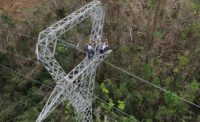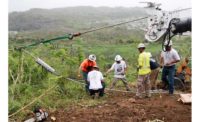Disaster Recovery
Puerto Rico Rethinks Power Grid Rebuild After Whitefish Energy Flap

High-Wire Work Whitefish has been working with about 500 specialty contractors to rebuild the electric grid in mountainous areas of Puerto Rico.
Photo Courtesy of Whitefish Energy
As private and public agencies continue to restore power to the 70% of Puerto Rico that is still without electricity, the island’s government announced it will cancel a $300-million grid-reconstruction contract with Whitefish Energy. Also, the U.S. Army Corps of Engineers announced its intention to triple a contract with Fluor Corp.
The island’s governor says he has requested mutual aid from New York and Florida utilities and hopes to have 1,000 crews working by Nov. 8. The Fluor contract details that the Puerto Rico Power Authority (PREPA) will perform 30% of the total electrical transmission and distribution power-grid restoration, while the Corps and its contractors will perform the remaining 70%.
Fluor’s grid rebuild contract, initially pegged at $240 million on Oct. 19, will increase to $840 million, pending available funds, the Corps announced on Oct. 29. The six-month contract could go up to $1.3 billion, said Lt. Gen. Todd Semonite, commanding general of the Corps, in an Oct. 20 Pentagon briefing.
Meanwhile, although critics have called out both public agencies and private companies for the slowness of the recovery efforts, workers say the island’s terrain and decrepit infrastructure make rebuilding a monumental task.
“I’ve never been a part of something on this grand a scale before. We call it a Type 1 configuration, meaning all available personnel are called upon,” says Sgt. 1st Class Anthony E. Persina, of the Corps’ 249th Engineers, or “Prime Power” battalion. “Type 1 hasn’t happened since Superstorm Sandy.”
Contract Concerns
Puerto Rico Gov. Ricardo Rosselló on Oct. 29 announced that PREPA would seek to cancel “immediately” its contract with Whitefish Energy. The announcement came two days after FEMA said it “has significant concerns with how PREPA procured this contract and has not confirmed whether the contract prices are reasonable.”
U.S. politicians also called into question the costs detailed in the Whitefish Energy contract, which listed ironworker, linemen and heavy-equipment operator wages ranging from $138 to $400 per hour and allowing for a $400 per diem per worker. Fluor’s Corps contract, which ENR obtained, had labor rates that were redacted.
“Taxpayers should pay a fair rate for the emergency repairs Puerto Rico desperately needs [and] not be gouged by Whitefish Energy or anyone else,” said Sen. Maria Cantwell (D-Wash), ranking member of the Senate Energy and Natural Resources Committee, in an Oct. 29 statement.
Whitefish spokesman Chris Chiames noted that the company’s small size allowed it to get on the ground on Oct. 2 and the company is partially responsible for turning on the lights in a half-million San Juan homes this week. “We secured the work in Puerto Rico because we got to the island quickly after Maria, built a plan with PREPA, earned their trust and confidence, and did not make financial demands that others were requiring,” said Chiames.
On Oct. 31, Whitefish announced that any of its approximately 500 subcontractors who wish to remain can continue their work under PREPA or other management. Whitefish says it will manage the work during the wind-down process.
PREPA CEO Ricardo Ramos signed the Whitefish contract. Whitefish was the only company that submitted a bid waiving up-front payment; and although PREPA never held formal public bidding, several other companies approached Ramos, including PowerSecure Inc., which required $25-million up front from the bankrupt utility, Ramos told CNN. PowerSecure later signed a $40-million contract with the Corps to provide additional support to repair the power grid in Puerto Rico, according to the Corps.
In the face of blistering news coverage, Ramos defended hiring Whitefish in a public speech, saying the company is “doing a great job. When Whitefish started working, everyone was cheering and clapping.” After the “tabloid” news coverage of the contract, Puerto Rican citizens have been “throwing stones and bottles” at Whitefish workers, prompting Ramos to comply with the governor’s request to cancel the contract, Ramos said.
Meanwhile, 31% of the country doesn’t have a cell signal. Of Puerto Rico’s 5,073 miles of roads, only 1,507 miles are open to vehicles, according to an Oct. 30 FEMA update. The Corps has installed 319 generators for critical infrastructure, with 52 more in the process of being installed. Weston Solutions soon will install a 50-MW generator at one of San Juan’s main power stations, the Palo Seco Plant.






